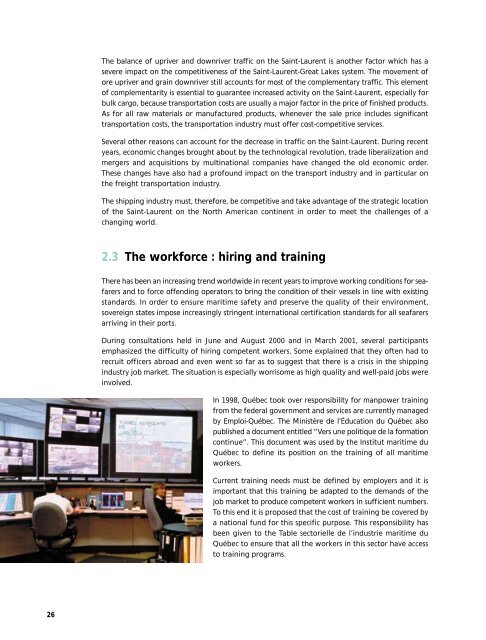Québec Marine Transportation Policy - Transport - Gouvernement ...
Québec Marine Transportation Policy - Transport - Gouvernement ...
Québec Marine Transportation Policy - Transport - Gouvernement ...
You also want an ePaper? Increase the reach of your titles
YUMPU automatically turns print PDFs into web optimized ePapers that Google loves.
26<br />
The balance of upriver and downriver traffic on the Saint-Laurent is another factor which has a<br />
severe impact on the competitiveness of the Saint-Laurent-Great Lakes system. The movement of<br />
ore upriver and grain downriver still accounts for most of the complementary traffic. This element<br />
of complementarity is essential to guarantee increased activity on the Saint-Laurent, especially for<br />
bulk cargo, because transportation costs are usually a major factor in the price of finished products.<br />
As for all raw materials or manufactured products, whenever the sale price includes significant<br />
transportation costs, the transportation industry must offer cost-competitive services.<br />
Several other reasons can account for the decrease in traffic on the Saint-Laurent. During recent<br />
years, economic changes brought about by the technological revolution, trade liberalization and<br />
mergers and acquisitions by multinational companies have changed the old economic order.<br />
These changes have also had a profound impact on the transport industry and in particular on<br />
the freight transportation industry.<br />
The shipping industry must, therefore, be competitive and take advantage of the strategic location<br />
of the Saint-Laurent on the North American continent in order to meet the challenges of a<br />
changing world.<br />
2.3 The workforce : hiring and training<br />
There has been an increasing trend worldwide in recent years to improve working conditions for seafarers<br />
and to force offending operators to bring the condition of their vessels in line with existing<br />
standards. In order to ensure maritime safety and preserve the quality of their environment,<br />
sovereign states impose increasingly stringent international certification standards for all seafarers<br />
arriving in their ports.<br />
During consultations held in June and August 2000 and in March 2001, several participants<br />
emphasized the difficulty of hiring competent workers. Some explained that they often had to<br />
recruit officers abroad and even went so far as to suggest that there is a crisis in the shipping<br />
industry job market. The situation is especially worrisome as high quality and well-paid jobs were<br />
involved.<br />
In 1998, <strong>Québec</strong> took over responsibility for manpower training<br />
from the federal government and services are currently managed<br />
by Emploi-<strong>Québec</strong>. The Ministère de l’Éducation du <strong>Québec</strong> also<br />
published a document entitled “Vers une politique de la formation<br />
continue”. This document was used by the Institut maritime du<br />
<strong>Québec</strong> to define its position on the training of all maritime<br />
workers.<br />
Current training needs must be defined by employers and it is<br />
important that this training be adapted to the demands of the<br />
job market to produce competent workers in sufficient numbers.<br />
To this end it is proposed that the cost of training be covered by<br />
a national fund for this specific purpose. This responsibility has<br />
been given to the Table sectorielle de l’industrie maritime du<br />
<strong>Québec</strong> to ensure that all the workers in this sector have access<br />
to training programs.


